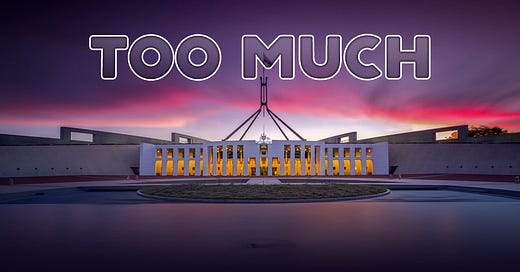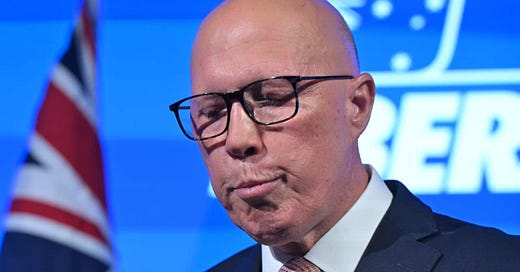
Too Much Government
Expectations of the role of the government have been rising steadily over the last decade. They rose substantially during the eastern states’ bushfires in late 2019 and early 2020, and again in response to the floods that followed in NSW and Queensland. And they reached stratospheric levels during the Covid panic.
Judged by the number of lives lost, those bushfires were far from the worst on record. Nonetheless, they were characterised as ‘unprecedented’ and prompted a chorus of demands for the Prime Minister to get involved. When it was discovered he had gone to Hawaii for a holiday with his family, he was accused of being negligent for leaving the country at such a time.
The Prime Minister did not leave the country when NSW and Queensland were hit by floods, but the opprobrium he attracted could hardly have been worse if he did. The floods were again described as unprecedented amid a chorus of claims the government should have acted sooner and done more.
The Covid schemozzle was obviously unprecedented and nobody could go anywhere. Once again, the Prime Minister and federal government were blamed – there were insufficient vaccines, the border should have been closed sooner, hotel quarantine was a failure, lockdowns were inadequate, plus a multitude of other perceived failures. All this despite the worst harm being done by state governments.
Thousands of kids were inspired to join the surf lifesavers, setting an example for the rest of the world.
Perhaps it is not surprising that many people think of the Prime Minister and the federal government when they think of ‘the government’. Federal politics tends to dominate the news, while the public’s understanding of our system of government is pretty dismal. Much of the media is pretty ignorant too, although hostility to Liberal leaders is also a factor.
But what these narratives reveal is that the expectations now placed on governments, of any kind, are higher than they have ever been. Whether it is floods, fires, droughts, earthquakes, cyclones or disease outbreaks, there is a popular and growing view that the government should not only be there to pick up the pieces, but should have anticipated the calamity and done everything possible to head it off.
By any standard this is both ridiculous and contradictory. Government is, after all, made up of politicians and public sector bureaucrats. Neither are experts at how the real world works so cannot possibly know what to do.
Most people readily acknowledge that governments are inefficient, bureaucratic and slow, yet somehow cling to the belief that next time will be different and more government will get it right.
In fact, Australia’s problem is too much government. From petty, intrusive local councils to authoritarian state governments and over-taxing, over-spending, ‘more money will fix it’ federal government, there is just too much of it.
The problem with this is obvious. The world is complex and changing – in social attitudes, world economics, geo-politics and of course technology. There is no way that politicians, public sector bureaucrats or regulators can hope to supervise or manage it. They are also often remote from the problems – how, for example, can a bureaucrat in Canberra possibly know enough to make a decision about a cyclone in Broome?
The famous economist Friedrich Hayek noted how difficult it was for people to fathom that local decision making leads to more efficient outcomes than central planning by politicians and public sector bureaucrats.
“The curious task of economics is to demonstrate how little they really know about what they imagine they can design.
To the naive mind that can conceive of order only as the product of deliberate arrangement, it may seem absurd that in complex conditions order, and adaptation to the unknown, can be achieved more effectively by decentralizing decisions.”
Expectations of the role of government have been rising steadily over the last decade.
There was a time, not that long ago, when Australia was a proud volunteer society. Moreover, almost everything was local.
Thousands of kids were inspired to join the surf lifesavers, setting an example for the rest of the world. Volunteer fire fighters saved whole communities. Dozens of charities, not just the Salvation Army and Red Cross, all volunteers, provided help and hope to those in need.
Indeed, prior to the emergence of the welfare state in the second half of the twentieth century, volunteer charities were involved in health care, childcare, education, unemployment and disability support. In the nineteenth century you would have been considered weird if you had predicted that most of these would end up being run by governments. These days you’d be called weird for suggesting volunteers might do them better.
Volunteers are still the first responders in many fire and flood emergencies as families, neighbours and friends rally around. Next are typically agencies such the State Emergency Service and Rural Fire Service in NSW, and their equivalents in the other states. Both are still volunteer based, although increasingly under the control of full-time public servants and subject to the inefficiencies of government bureaucracy. In Victoria, the sad decline of the CFA at the hands of the unions is an example of that.
A tragic example of the harm being done to our volunteer society was seen during the Covid pandemic when many volunteers were required to be fully vaccinated. Unvaccinated volunteers were turned away and not permitted to fight fires or rescue flood victims, even when working outside where infection was rare.
Even after it became obvious that Covid vaccines did not prevent infection or transmission, the obligation to be fully vaccinated was retained. This was not only unscientific but also destructive. It seriously undermined the capacity of those organisations to help people. In NSW, RFS volunteers on the Central Coast fell by about 50% and in other areas SES volunteers left and some SES stations closed.
It also led to increasing demands for the federal government to bring in the ADF. Obviously ADF members are not volunteers, but they are also not intended to be used as emergency workers. Indeed, using the ADF for anything other than the defence of the country undermines its purpose and reduces its capabilities.
While we sometimes hear governments claiming to honour volunteers, the trend is downhill. The more red tape, bureaucratic oversight and regulation imposed, the more volunteers bail out.
The post Too Much Government appeared first on Liberty Itch.












